The idea of selling the same bottles of wine to either drink in or take away does not seem to be that inspired today, but when Vinoteca first opened its doors it got the rest of the wine bar scene turning their heads.
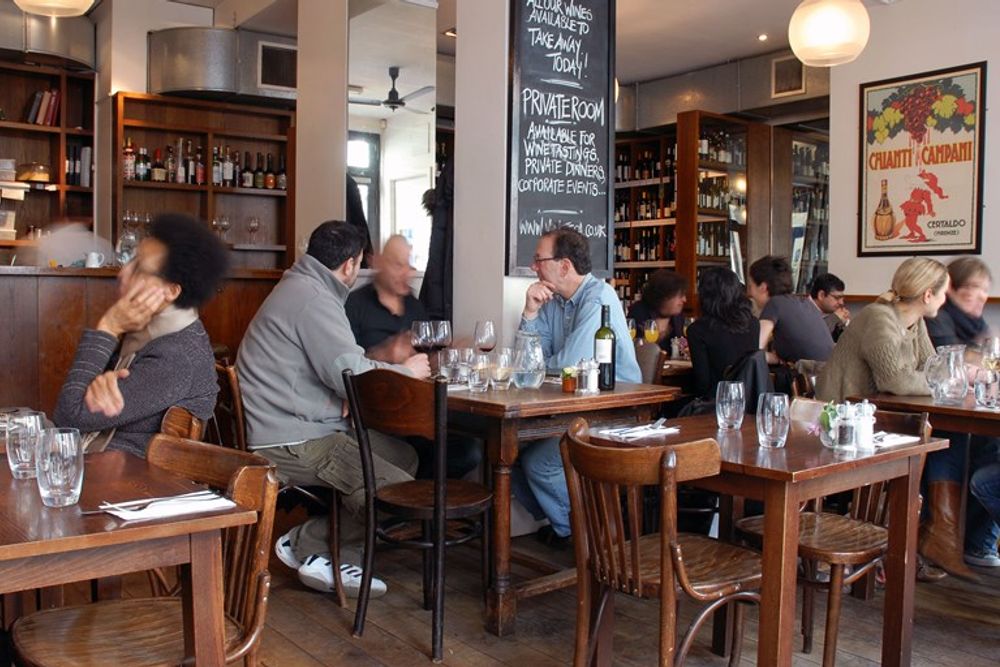
Where it all started in 2005…Vinoteca Farringdon
There comes a time in every successful business that you are faced with the dilemma: do you stick or do you twist? Particularly when you are running an on trend restaurant, bar or pub business.
Will the reasons your business model took off in the first place be replicated if you look to open another site. But equally do you risk being over taken by those willing to take the risk and open up more sites and take the competitive edge.
It is a question you find yourself asking of any new up and coming operator: where next?
There are certainly plenty of role models to turn to. Vagabond is arguably the most ambitious. It has just opened its fifth site in Victoria’s new Nova food and drink development, its biggest yet with 140 wine sampling machines in a 2,00 sq ft space. It is to add a sixth in new Battersea Power Station complex and then has plans to open up to three more sites a year over the coming years.
Founder Stephen Finch has even talked of expanding out in to Europe and taking its model to cities such as Berlin, Amsterdam where there is already a vibrant wine bar scene.
Then there is Humble Grape’s recent successful crowdfunding campaign which brought in more than the £1m it hoped to raise to help take its business from its current two sites, on Battersea Rise in SW11 and in Fleet Street, up to six sites. It also has ambitious plans to scale up its model that brings interesting affordable wines from all over the world, which is proving particularly successful in attracting a younger audience. It hopes to introduce more sites and build up the wine club and online side of its business.
This is Humble’s Grape second crowdfunding initiative and has clearly learnt lessons from the likes of Brewdog in giving small investors, essentially your brand ambassadors, a stake in your growing business.
M Restaurants managed to raise £1.4m in less than three days through its crowdfunding campaign last autumn to help back its third restaurant which is opening in Twickenham in the summer.
Interestingly both Finch and James Dawson, the founder of Humble Green, have backgrounds in management consultancy and finance respectively and whilst both share a clear passion for wine, they did not go in to running a wine bar to be pouring wine and cleaning glasses all night.
True pioneers
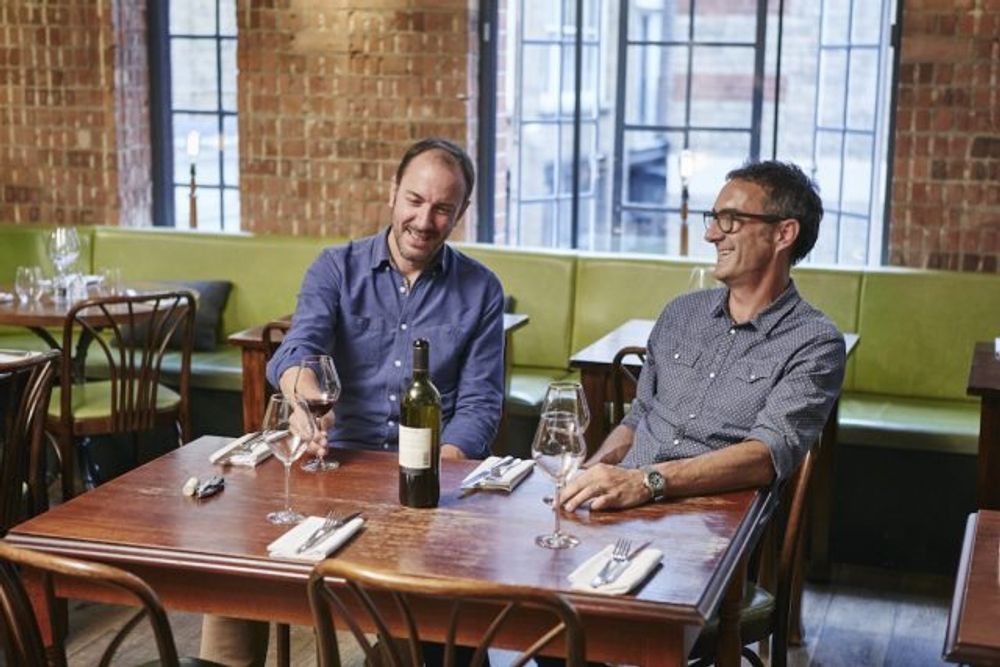
Vinoteca’s Charlie Young, left, and Brett Woonton have been setting the bar, for its competition since 2005
But would they be where they today if it was not for the true pioneers of the modern wine bar, Vinoteca. It was Charlie Young and Brett Woonton’s desire to bring their version of the wine bars of Italy and Spain that inspired them on their wine travels that really set the benchmark for others to follow. Wine bars where you could sit and enjoy good, quirky, affordable wines directly sourced from growers from all over the world. Wines you could either pay to drink in, at a slight mark up, or take to drink at home. The true Vinoteca model.
It is now 12 years since they opened their first iconic site in Farringdon. Their expansion to five sites now appears relatively modest compared to the speed that some of the newcomers are growing, but arguably its steady approach to growth means it is still setting the standards for others to follow.
It is also very in keeping with the modest personalities of both Young and Woonton, who for all their success are as down to earth and as humble about what they do than when they only had to worry about attracting customers to their Farringdon site.
When asked recently by Drinks Business what was the best advice he has ever received Woonton said it came from his art teacher who told him “Don’t take yourself too seriously”. Which is very much the Vinoteca way.
Growing organically
Business leaders often talk about “growing organically” when asked about their developments plans. Which never really seems to make sense. But if it does, then Vinoteca, Young and Woonton are very much “organic growers”.
There was no five or 10 year business plan to have five or six sites by 2017. Each new site has been opened because new opportunities have come up, and increasingly, says Young, they are invited to pitch.
“We never set out to do more than one site,” he says. It was only when they took the plunge to open the second site in Marleybone in 2010 that they realised the operations side was not as difficult as they thought and it was possible to build scale, gradually. Hence the Soho site soon followed, with Chiswick in 2013 and then arguably now its flagship outlet in Kings Cross in 2015.
Open to advice
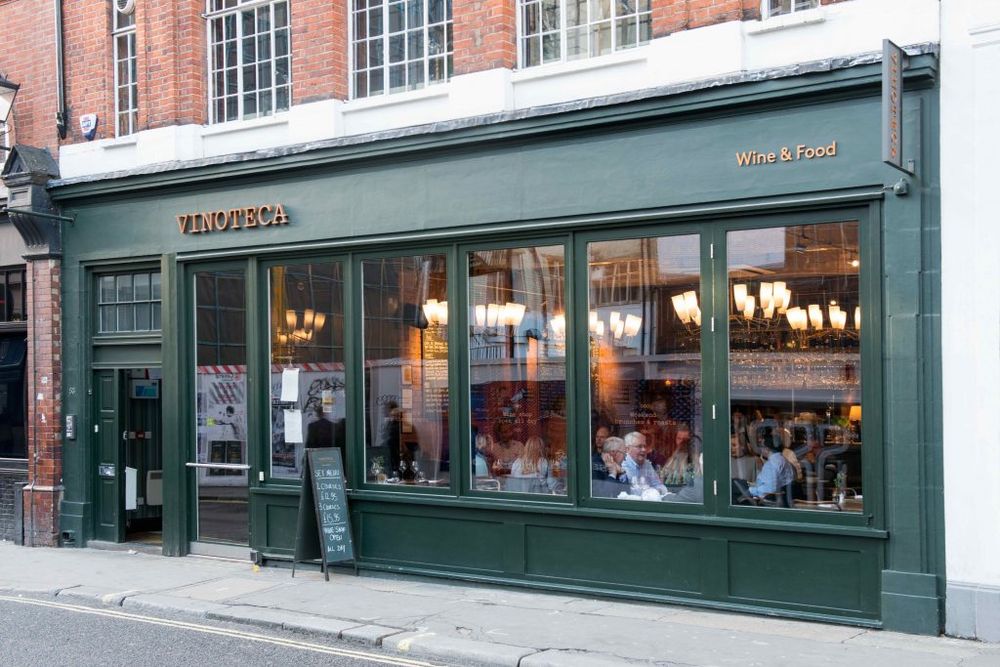
Vinoteca Soho was the group’s third site following closely on from Marleybone in 2010
His big advice to any operator looking to open new sites is to get advice. To work with people who have been there and done it. Young says the influence of restaurant investor, Paul Campbell, was hugely important in helping Vinoteca to expand. Campbell, who took a 10% stake in Vinoteca, has also worked with Hawksmoor, and was former chief executive of the Clapham House Group.
“If you want to know how to build your business, then make sure you work with someone who has that experience,” says Young, who stresses Vinoteca is still very much working to its own pace and would only look to open one site a year if the right locations become available.
Interestingly when The Buyer recently spoke to Will Beckett, one of the co-founders of Hawksmoor, he was also quick to recognise the advice and support they had received from key players in the industry.
Scott Collins, co-founder of the breakthrough burger business, MEATLiquor, recently told the BBC that the best advice he would now give himself when starting out would not to be “afraid to reach out to your industry heroes” even if it means just cold calling them. As he says in this short video: “I did twice and it’s paid massive dividends.” After all, as he says, if you “ask out for someone’s help you have to a very good reason not to give it”.
Humble Grape’s James Dawson has also said how important Martin Williams at M Restaurant has been in offering him advice on growth and using crowdfunding, for example, as a key part of your strategy.
Young also cites the significant role that Financial Times restaurant critic and consultant, Nicholas Lander, has had in Vinoteca’s development.
Young says they had enjoyed a good relationship with Lander ever since he gave their Farringdon site a glowing review in the Financial Times and had stayed close still. It was largely through his contacts at Argent, the property development company behind the new Kings Cross development, that saw Vinoteca become part of that.
It is a site that can only become more important to the group as more businesses, including Google’s UK HQ bringing 3,500 staff alone set to open in 2019. “This is a dream site. It is busy now but will only get busier,” says Young. “It is a big site and it was a to still make it feel like a Vinoteca and are really pleased with what we have here.”
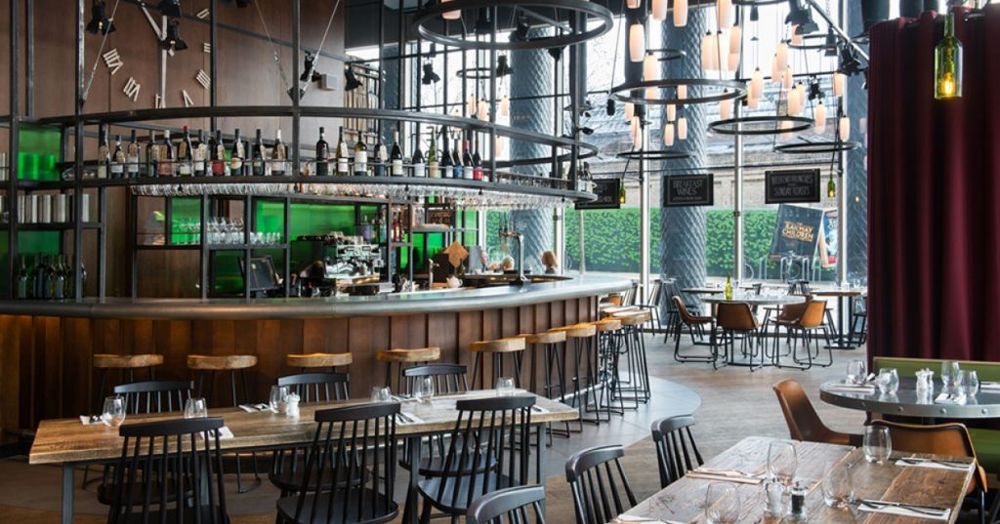
Vinoteca’s most ambitious site to date at London’s King’s Cross
Bigger and more attractive
So it seems the bigger you become the easier it gets to find the best sites to help grow your business. All of the above businesses, and countless others, will say how hard it is to find the right location for your business model. And then when you do, how difficult it then is in getting the finance to fund it.
But one you have a name, a reputation, an ability to draw in an engaged customer, then the property and retail companies will start knocking on your door. As Young says: “It certainly makes you more attractive to them. We are seeing it more and more with these kind of property developments and we get a lot of interest from them.”
It has been a similar story for Will Beckett at Hawksmoor as he told The Buyer: “We have gone from being young upstarts to being part of the establishment and are fortunate in that landlords are keen to have us part of what they are doing.”
For a new site like Nova at Victoria who they have on board as their restaurant and bar partners is very much a refection of what that development is all about. Hence attracting big chef names like Jason Atherton, and his Hai Cenato restaurant, and on trend operators like Shake Shack and Vagabond will be all part of whether it succeeds or not.
Central structure
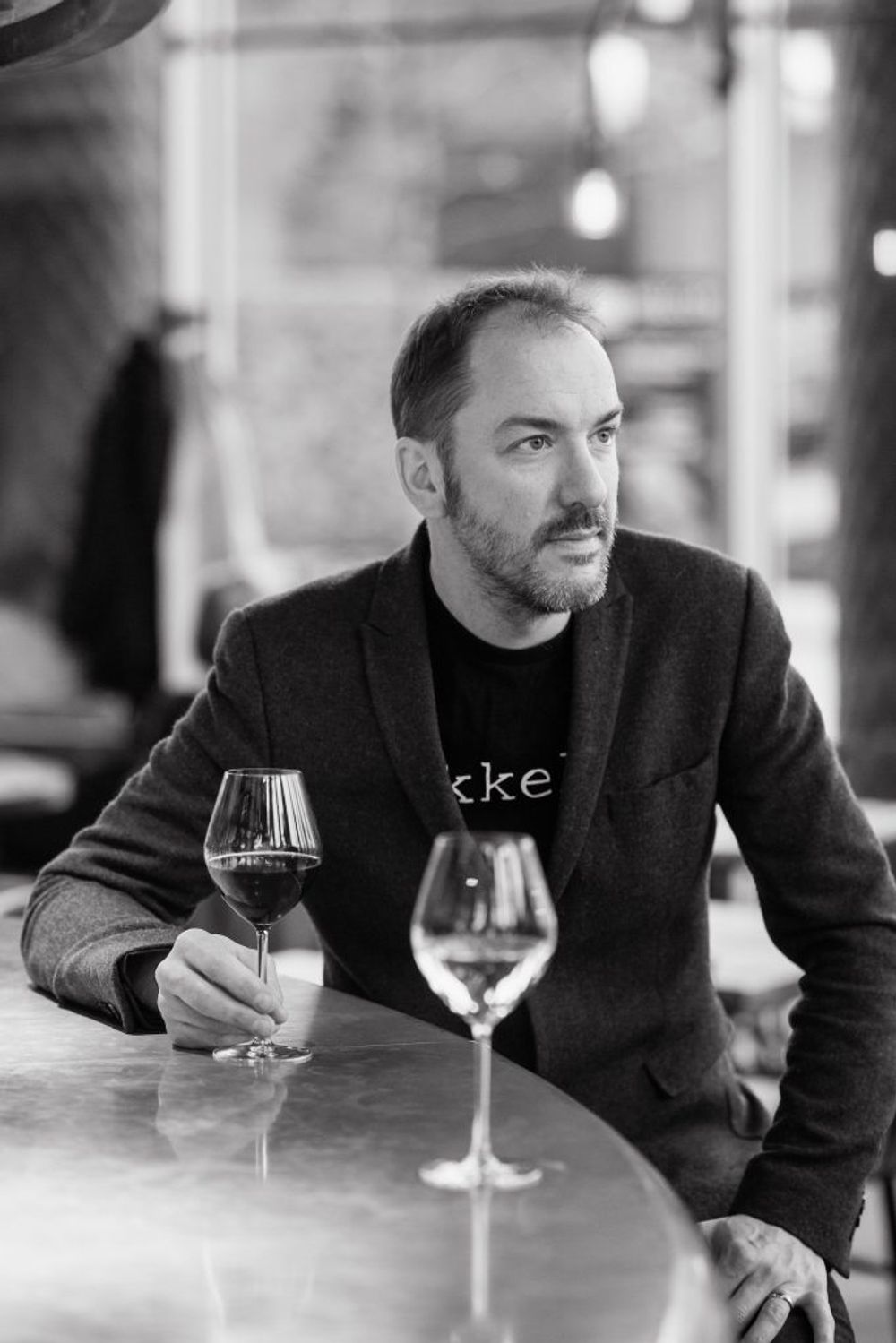
Charlie Young says it has been key to keep a small central management team Picture: Matt Grayson
For Young the key to building a small restaurant or bar group is to make sure you have a tight, low cost central management team which for them does not stretch too far from the founders, an operations manager, financial controller and an executive chef. Which considering it now turns over £6.5m and has an overall workforce of 150 is very tight indeed.
It is from that central base that wine and food menus can be managed for each of the sites, with the executive chef, for example, working with the individual site chefs and teams to ensure the outlets are different, but still have a common theme and purpose to them.
Vinoteca is also particularly keen to run its business as ecologically and environmentally as it can and will co-ordinate initiatives centrally across all its sties. Hence the number of bag in box and cask wines it is now listing.
Young sees training as being a key area for the future as the bigger you get the harder it is to keep on top of all the staff training that is needed. “We need to make our training more systematic.”
Young says it is also important to reach out to your peers in the sector to see what you might be able to do together for mutual benefit. It now, for example, has an arrangement with Planet of the Grapes to use its central warehousing facility to stock some of its wines and deliver wines to its sites. Helping them both along the way.
Stick to your principles
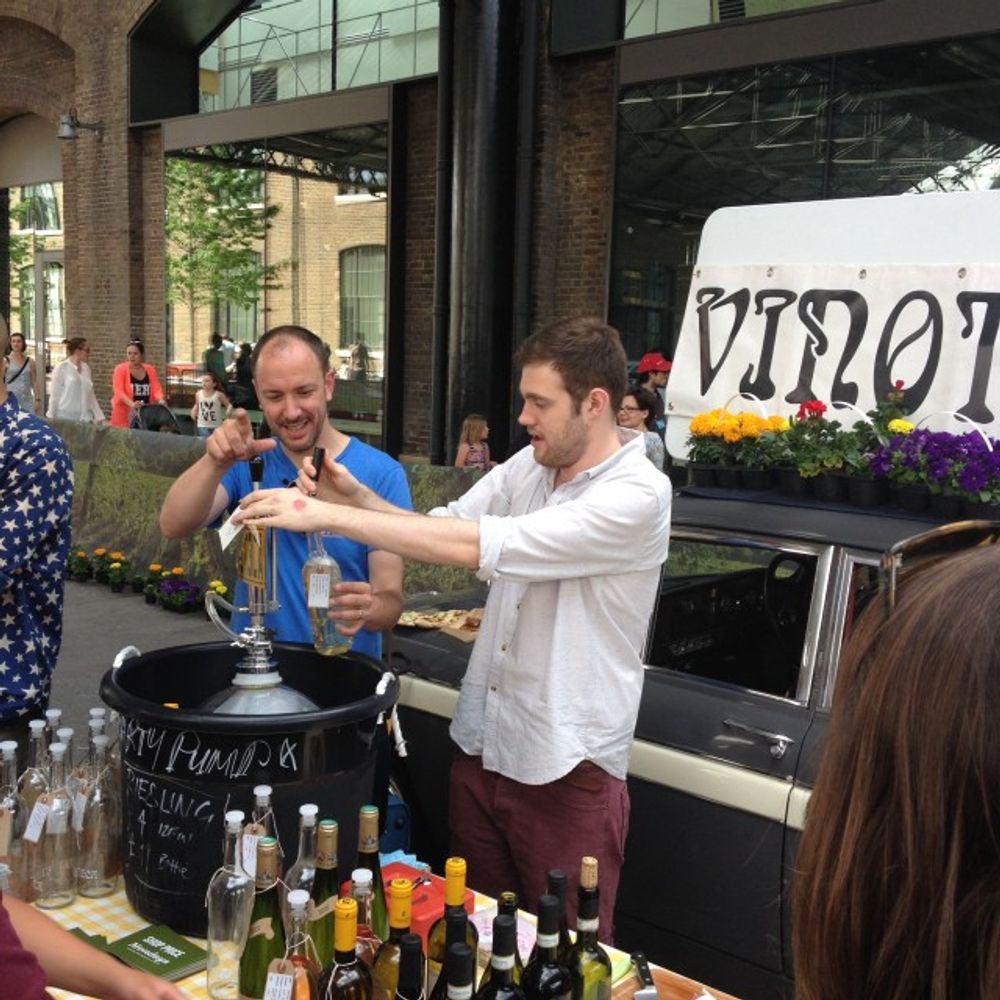
Doing things differently and being the first to try unusual wines by keg and tap is what gives Vinoteca its edge
But ultimately it is making sure you don’t lose sight of what made you successful in the first place, stresses Young. Your business might have grown and you are now serving more people, but you can’t lose the focus, particularly around the wines you are sourcing and selling.
“How do you keep your brand identity as you grow from one to two to five and more outlets,” he says.
For example, despite now having high profile venues its wine strategy is still very much around finding interesting, affordable wines that they can hand sell to their customers. It still has around 50 wines under £25 a bottle compared to 80 wines under £20 when it first started in 2015. Which considering the increased costs and duty is still great value for money, says Young.
“We take our wines seriously, but we are not serious about wine,” is still very much Vinoteca’s model. “But we have never offered our customers safe options. We like our wines to have an edge. We want to be excited about it. That said we don’t want them to be too much of a journey and encourage people to try different wines by the glass. It is why we have introduced wine flights and tasters for people to try and taste.”
By going direct to more producers and selling the wine in different formats, like by tap, it can also keep costs and wine list prices down.
The retail side of the business is still very important for Vinoteca. “It’s not a gimmick,” he stresses, and accounts for around 15% of its wet turnvover, and up to 20% in Farringdon. “It helps give us a point of difference, still. That is why we work so hard to source our wines so that we can offer good value at retail and on-trade prices.”
Working with suppliers
Although it sources and ships a lot more of its wines directly, and Young admits there is “less space on our list to fight over” it also works with a core number wine suppliers in the UK. Suppliers Young says that understand its model and are prepared to work on the long term. Key suppliers include Astrum,Fields Morris & Verdin, Raymond Reynolds, Swig, Indigo Wines and Clark Foyster.
It still changes its wine lists twice a year – 70 wines at a time to freshen things up.To do that it also knows it has to innovate and keep ahead with trends. Particularly in how wine is being served be it by tap, in keg, bag in box or increasingly in a can.
“I really like the idea of wines in a can. Just look at what they have done with craft beer. I think we can offer some really interesting wines by the can. It will be great to serve and to sell in retail.”
But equally Young says it still has “a lot to learn” but is confident it can keep to its initial values no matter how big it becomes. “We want to be able to offer really good food and wine, that is not too complicated at the best value.”
Which is just what he could have said when he and Brett Woonton first opened Vinoteca in Farringdon in 2005.








































